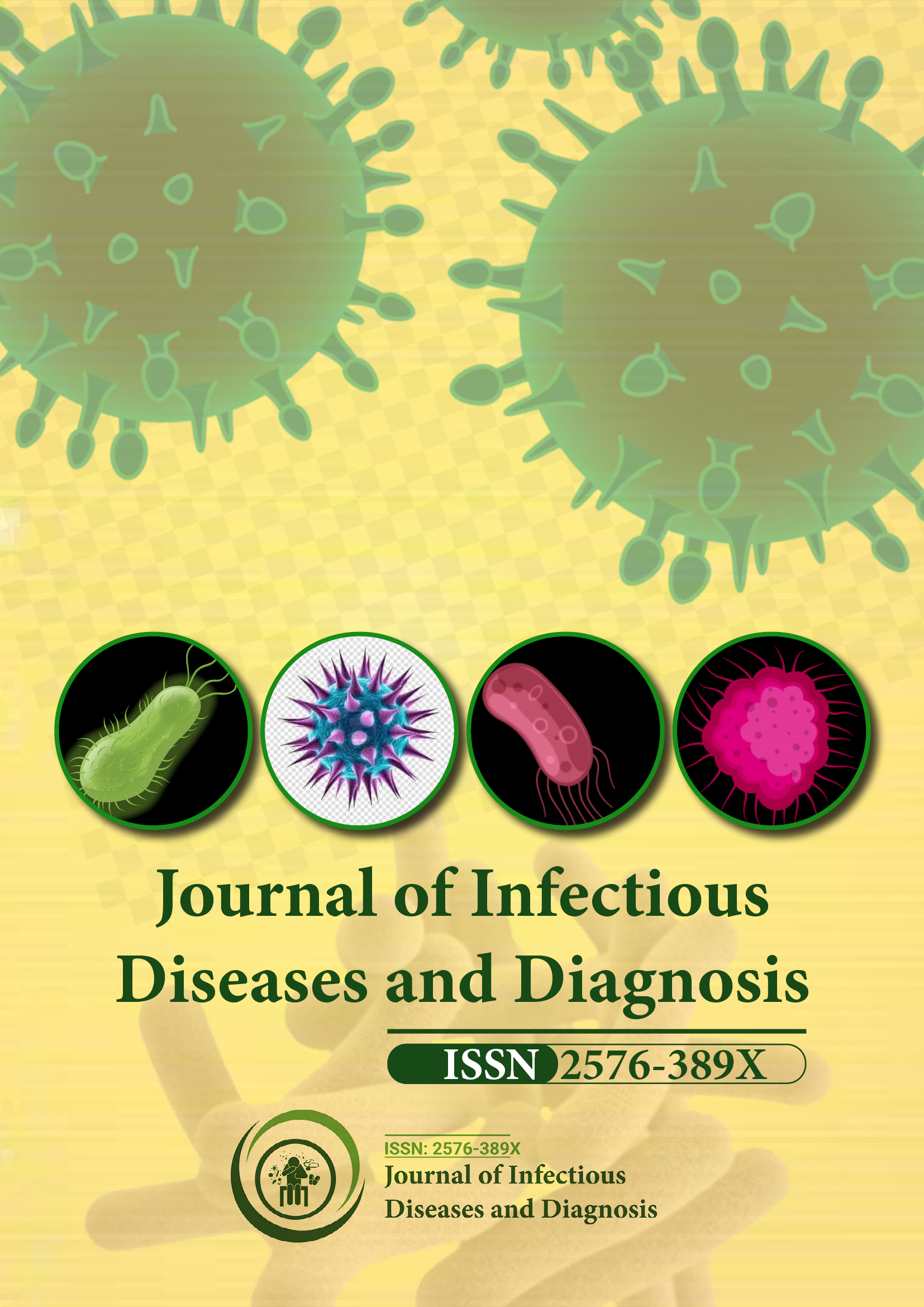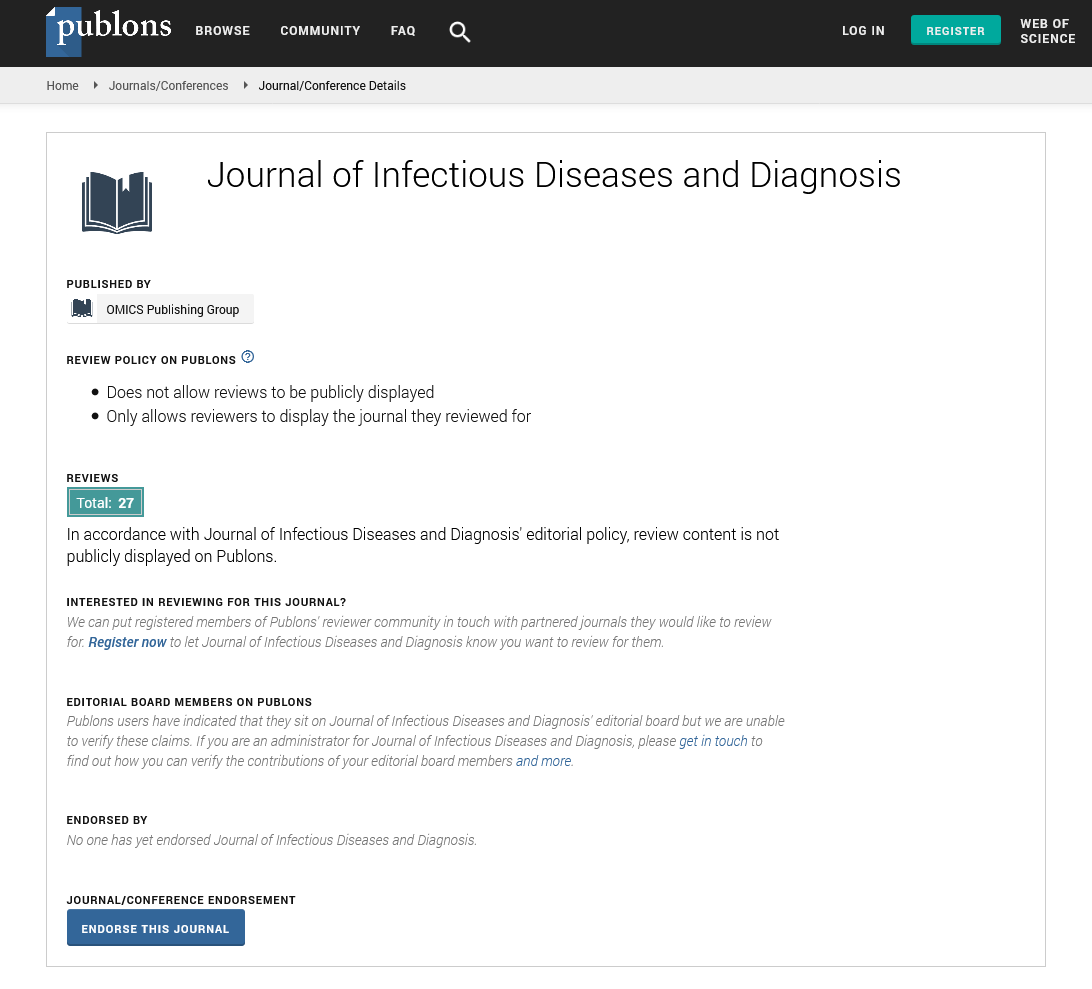Indexed In
- RefSeek
- Hamdard University
- EBSCO A-Z
- Publons
- Euro Pub
- Google Scholar
Useful Links
Share This Page
Journal Flyer

Open Access Journals
- Agri and Aquaculture
- Biochemistry
- Bioinformatics & Systems Biology
- Business & Management
- Chemistry
- Clinical Sciences
- Engineering
- Food & Nutrition
- General Science
- Genetics & Molecular Biology
- Immunology & Microbiology
- Medical Sciences
- Neuroscience & Psychology
- Nursing & Health Care
- Pharmaceutical Sciences
Short Communication - (2023) Volume 8, Issue 1
Another Novel Approach towards Therapeutic Regimens against SARS-CoV-2 Infection
Neha Kamat*Received: 02-Jan-2023, Manuscript No. JIDD-22-19897; Editor assigned: 04-Jan-2023, Pre QC No. JIDD-22-19897 (PQ); Reviewed: 18-Jan-2023, QC No. JIDD-22-19897; Revised: 25-Jan-2023, Manuscript No. JIDD-22-19897 (R); Published: 01-Feb-2023, DOI: 10.35248/2576-389X.23.08.196
About the Study
SARS-CoV-2, the virus responsible for COVID-19, is a highly contagious and potentially life-threatening virus. While there is currently no specific therapeutic regimen against SARS-CoV-2 infection, a number of treatments have been developed to help manage the symptoms of COVID-19 and support the recovery of infected individuals.
One of the most widely used treatments for COVID-19 is supportive care, which includes providing oxygen to help manage difficulty breathing, and fluids to prevent dehydration. In some cases, corticosteroids may also be used to reduce inflammation in the lungs and improve oxygenation [1]. Antiviral drugs, such as remdesivir, have also been shown to be effective in treating COVID-19. Remdesivir is an antiviral drug that works by inhibiting the replication of the virus, leading to a reduction in the duration of illness and the need for hospitalization.
Another promising treatment is monoclonal antibodies, which are lab-made molecules that mimic the immune system’s ability to fight off viral infections. They are designed to bind to specific viral proteins, preventing the virus from entering and infecting human cells [2]. Monoclonal antibodies have been authorized for emergency use in the treatment of COVID-19 by FDA, EUA and other regulatory bodies for high-risk individuals.
In addition, convalescent plasma therapy has been used in some cases as a treatment for COVID-19. This involves administering plasma from recovered COVID-19 patients to infected individuals, which contains antibodies that can help fight the virus. However, the effectiveness of convalescent plasma therapy is still being studied [3].
Other treatments that have been used to manage COVID-19 include Tocilizumab, a monoclonal antibody that targets the inflammatory response to the virus, and Kaletra, a combination of lopinavir and ritonavir, which are antiviral drugs. It is important to note that the therapeutic regimens for COVID-19 are still evolving and new treatments are continuously being developed and studied. The best treatment for an individual will depend on the severity of their illness and other factors such as age and underlying health conditions.
In addition to these specific treatments, it is also crucial to maintain a healthy lifestyle and manage underlying health conditions to support the recovery of individuals with COVID-19. This includes eating a balanced diet, getting regular exercise, and managing stress levels. In this study, while there is currently no specific therapeutic regimen against SARS-CoV-2 infection, a number of treatments have been developed to help manage the symptoms of COVID-19 and support the recovery of infected individuals [4]. These include supportive care, antiviral drugs, monoclonal antibodies, convalescent plasma therapy, Tocilizumab and Kaletra. The best treatment for an individual will depend on the severity of their illness and other factors such as age and underlying health conditions. It is important to follow the guidelines of the health authorities and the recommendations of healthcare professionals when it comes to treating COVID-19.
The SARS-CoV-2 virus, which causes COVID-19, has resulted in a global pandemic, leading to a worldwide effort to develop effective treatments. There have been several therapeutic approaches used in the treatment of COVID-19, including antiviral medications, immunomodulatory agents, and convalescent plasma therapy.
In addition to these established treatments, researchers are exploring new and innovative approaches to treating COVID-19. For example, some researchers are investigating the use of monoclonal antibodies, which are laboratory-made molecules that mimic the immune system's ability to fight off infections. Another approach being explored is the use of RNA interference technology to target specific genes in the virus, which could help to limit its ability to replicate and cause disease.
Other researchers are looking at repurposing existing drugs for use against SARS-CoV-2. For example, some studies have shown that the anti-inflammatory drug tocilizumab may help to reduce the severity of COVID-19 in certain patients [5]. There is also ongoing research into the use of drugs that boost the immune system, such as interferon and Interleukin-6 (IL-6) inhibitors, to help the body fight off the virus more effectively.
Conclusion
Overall, there is ongoing research into new and innovative approaches to treating COVID-19, and it is possible that new therapeutic regimens may be developed in the future. However, it is important to note that it can take many months or even years of research and clinical trials before new treatments are approved and widely available.
References
- Polosukhin VV, Richmond BW, Du RH. Secretory IgA deficiency in individual small airways is associated with persistent inflammation and remodeling. Am J Respir Crit Care Med. 2017;195(8):1010-1021.
[Crossref] [Google Scholar] [PubMed]
- Lareau SC, Fahy B, Meek P, Wang A. Chronic obstructive pulmonary disease (COPD). Am J Respir Crit Care Med. 2019;199(1):P1-P2.
[Crossref] [Google Scholar] [PubMed]
- Wang C, Xu J, Yang L. Prevalence and risk factors of chronic obstructive pulmonary disease in China (the China Pulmonary Health [CPH]study): A national cross-sectional study. Lancet 2018;39l(2):1706-1717.
[Crossref] [Google Scholar] [PubMed]
- Mathers CD, Loncar D. Projections of global mortality and burden of disease from 2002 to 2030. PLoS Med. 2006;3(11):e442.
[Crossref] [Google Scholar] [PubMed]
- BR Celli, W MacNee. Standards for the diagnosis and treatment of patients with COPD: a summary of the ATS/ERS position paper. Eur Respir J. 2004;23(6):932-946.
[Crossref] [Google Scholar] [PubMed]
Citation: Kamat N (2023) Another Novel Approach towards Therapeutic Regimens against SARS-CoV-2 Infection. J Infect Dis Diagn. 8:196.
Copyright: © 2023 Kamat N. This is an open-access article distributed under the terms of the Creative Commons Attribution License, which permits unrestricted use, distribution, and reproduction in any medium, provided the original author and source are credited.

